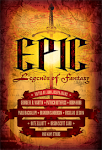
From inside flap:
“Murder is no laughing matter.
Yet a prominent Indian scientist dies in a fit of giggles when a Hindu goddess appears from a mist and plunges a sword into his chest.
The only one laughing now is the main suspect, a powerful guru named Maharaj Swami, who seems to have done away with his most vocal critic.
Vish Puri, India’s Most Private Investigator, master of disguise and lover of all things fried and spicy, doesn’t believe the murder is a supernatural occurrence, and proving who really killed Dr. Suresh Jha will require all the detective’s earthly faculties. To get at the truth, he and his team of undercover operatives—Facecream, Tubelight, and Flush—travel from the slum where India’s hereditary magicians must be persuaded to reveal their secrets to the holy city of Haridwar on the Ganges.
How did the murder weapon miraculously crumble into ash? Will Maharaj Swami have the last laugh? And perhaps more important, why is Puri’s wife, Rumpi, chasing petty criminals with his Mummy-ji when she should be at home making his rotis?
Stopping only to indulge his ample Punjabi appetite, Puri uncovers a web of spirituality, science, and sin unique in the annals of crime.”
This is Tarquin Hall’s second book in the Vish Puri, most private investigator, series. The first book The Case of the Missing Servant was very successful. The story begins with vivid detail to provide the reader with the feeling of being present in Delhi. The heat is palpable combined with the customs within the Indian culture. As with the first book there is a glossary to provide explanations for meanings for unfamiliar Indian terms.
Vish Puri continues to sneak snacks throughout the day despite his wife, Rumpi, providing a lunch. The detective continues his habit of a voracious appetite while at work, eating delectable snacks, of various descriptions, that expand his waistline and ease his tension.
Vish Puri, a 50-ish man, follows a traditional role rather than a modern one, often reflecting upon the social and political structures of Delhi and India such as “India’s recent economic rebirth”. It is this theme that reoccurs throughout the entirety of the book.
Mr. Hall provides thorough though brief glimpses at the history of India to reflect the current conditions including political corruption, and how the characters relationships interact within that framework.
The investigation leads Vish Puri to the Godman, Maharaj Swami, who runs a spiritual centre. This centre, the Abode of Eternal Love, is located in the foothills of the Himalayas. There, Swami’s clientele pay exorbitant sums in an attempt to reach enlightenment. Puri’s investigative undercover team, Facecream and Flush, infiltrate the spiritual centre with the intention of finding “proof” whether Swami arranged the death of Dr. Sha, and more particularly, how the levitation and disappearance of Kali was done. There is a scene where Facecream learns a vital lesson about healing herself, which in itself contradicts Mr. Hall’s inference throughout the book that spiritualists are nothing more than conmen.
However, the endings for the investigations into Dr. Sha’s murder and Rumpi and Mommy-ji’s “kitty party” theft are plausible. There were several hilarious portions throughout and some tense moments. It’s a good read and should content anyone looking for a cozy.
Review copy provided by Lucinda Blumfeld.
Book format: hardcover, 320 pages
Publisher: Simon & Schuster
Author website: Tarquin Hall
Available: June 1, 2010
Amazon.com
Amazon.ca
Chapters.indigo.ca















No comments:
Post a Comment